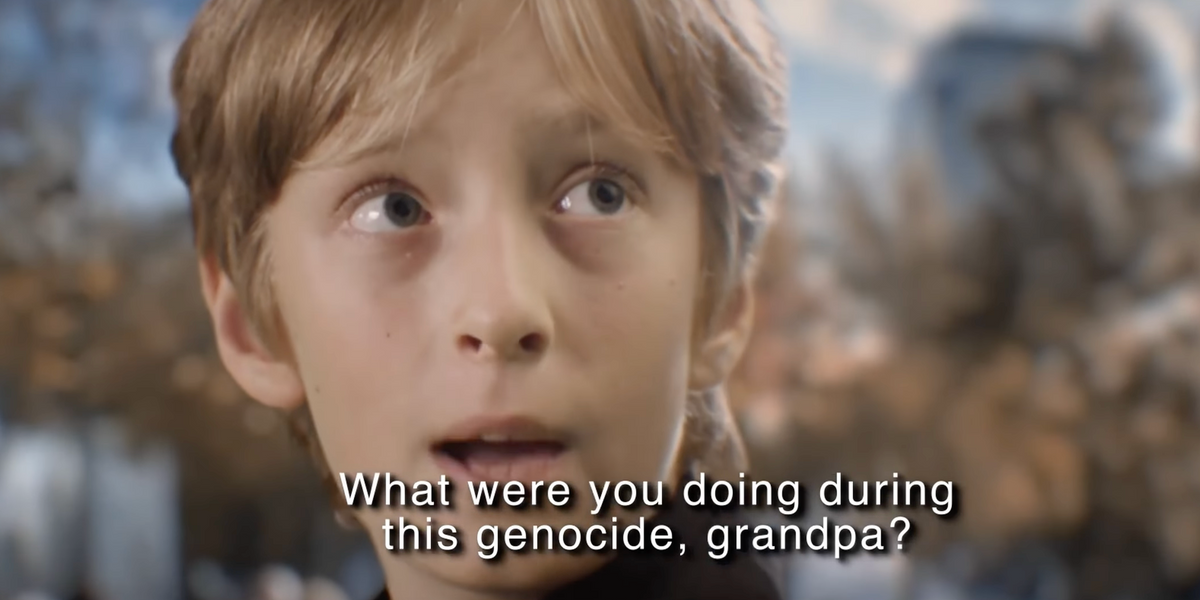“Well, you see son, the perpetrators of that genocide were the victims of the largest genocide of the 20th Century, so nobody felt comfortable doing or saying anything.”
It’s a bit more than “nobody”.
https://news.un.org/en/story/2024/09/1154391
The problem is that the minority that is uncomfortable doing or saying anything is backed by half the worlds carrier fleets and thousands of nuclear armed ICBMS.
Grandson: What were you doing during the genocide?
Me: Probably making shitty memes about it.
I really wish people would learn the difference between begging the question and raising the question.
Colloquially, the phrase beg the question also has a separate sense as a synonym for “raise the question” or “prompt the question”.
Well there it is.
That said, I’m glad you shared this as I hadn’t ever thought of it before.
In a day and age where the people are growing a part from they’re own language, your asking alot of them. I guess it literally doesn’t effect them much…
This was a painful comment to read, well done. 💢
*apart
*their
*you’re
*a lot from
You forgot *affect 😉
Also “literally” was meant as a double entendre, since we’re speaking about words and that term is so often abused.
*Affect
I’m not trying to be rude, but it’s “day in age,” not “day and age,” what would that even mean, lol
shhh
This is a joke
That’s what the spoiler is for. Note that I corrected one of the few correct things about that comment
I inherited this pet peeve from someone else and at the same time, developed the pet peeve of inheriting other people’s pet peeves.
A mistranslation from Latin versus the plain meaning that’s also what everyone intends and infers. Wow. What a dilemma.
I’ve been thinking about this exact question recently.
My Austrian grandmother and her sister were working class teenagers during the war. They couldn’t realistically have done anything to stop the Nazis. They didn’t really do much to help but since they were seamstresses they secretly snuck the Jewish family in the building some sewing supplies. It wasn’t much and they stopped when they were told that someone had reported them to the Gestapo. Their experience during the war was dodging bombs and trying to find something to eat.
None of that matters. When I was a kid growing up in the US people regularly made Nazi jokes as soon as they found out about my heritage. Nobody was willing to entertain any ideas that maybe those civilians shouldn’t have been held accountable.
History judged all of Germany and Austria harshly. It judged the civilians harshly and it judged their descendants harshly.
https://news.un.org/en/story/2023/12/1144717
The world is watching.deleted by creator
The glaring difference between the two is our level of active involvement.
Solidarity is one thing. Actually doing something about Sudan would require some sort of deliberate involvement.
In the case of Gaza we could likely make a huge difference if we just stopped arming the aggressors.
We don’t send arms to Sudan. We don’t send arms to Putin. We don’t send arms to the Sri Lankan military. We don’t send arms to Boko Haram. We don’t send arms to Myanmar.
deleted by creator
Oh in that case, we should probably stop sending arms to Saudi Arabia, too. It’s crazy we’re still allied with them after 9/11.
deleted by creator
I understand the frustration, but blaming individuals for a government’s actions, especially in 2024, feels misplaced. The reality is, many of us feel powerless to influence our own governments, let alone foreign policies, especially when it comes to complex international conflicts like the one in Gaza.
The U.S. government has entrenched interests and a long history of unconditional support for Israel, sustained by billions in taxpayer dollars. Despite widespread protests and public outcry, these policies seem nearly immune to change. It’s disheartening, but the truth is, most citizens have little say in how their tax money is used, especially on issues where both major political parties are largely aligned.
Voting every four years feels inadequate when the system itself limits real choices and perpetuates the status quo. Yes, we can protest, but even that has its limits. The mechanisms of government and foreign policy are beyond our direct control, leaving many feeling like we’re just along for the ride—forced to watch, speak out, and hope for change that rarely comes.
So while we share the outrage, it’s unrealistic to act as if we, as ordinary people, have the power to stop a war machine fueled by vested interests. The whole system feels like it’s rigged to keep us eating the consequences, whether we like it or not.
Tanked the reputation of the Genocidal Apartheid regime as fast as possible.
I don’t know, I still want to do something but I don’t think street protests are enough. And I am against violence.
With Ukraine I donate money, early on I donated for buying drones. With Palestine it’s so bad that I think donations won’t reach them.
Source: I grew up in 3rd world countries where pacific protests for teachers salary are common place but won’t solve anything. I’ve also lived in another 3rd world country with strong unions where at least once a month there was a 1000 people protest in the main street in the capital, plus ad hoc protests that are much bigger, and that country is still sinking very fast.
I know this is not the point, but “begs this question” is the oddest construction of that phrase I’ve heard yet.
“Begs the question” frustrates me. I know language changes, I know I shouldn’t be prescriptivist about this.
But it always strikes me as someone trying to sound smart and failing. They think it’s a fancy way of conveying something it didn’t mean (though now it does because people used it so much without knowing what it meant).
Just use “raises.”
I wonder how future historians will compare the October 7th, 2023 and the April 19th, 1943 events.
the real question is what did you do to make it worse?








